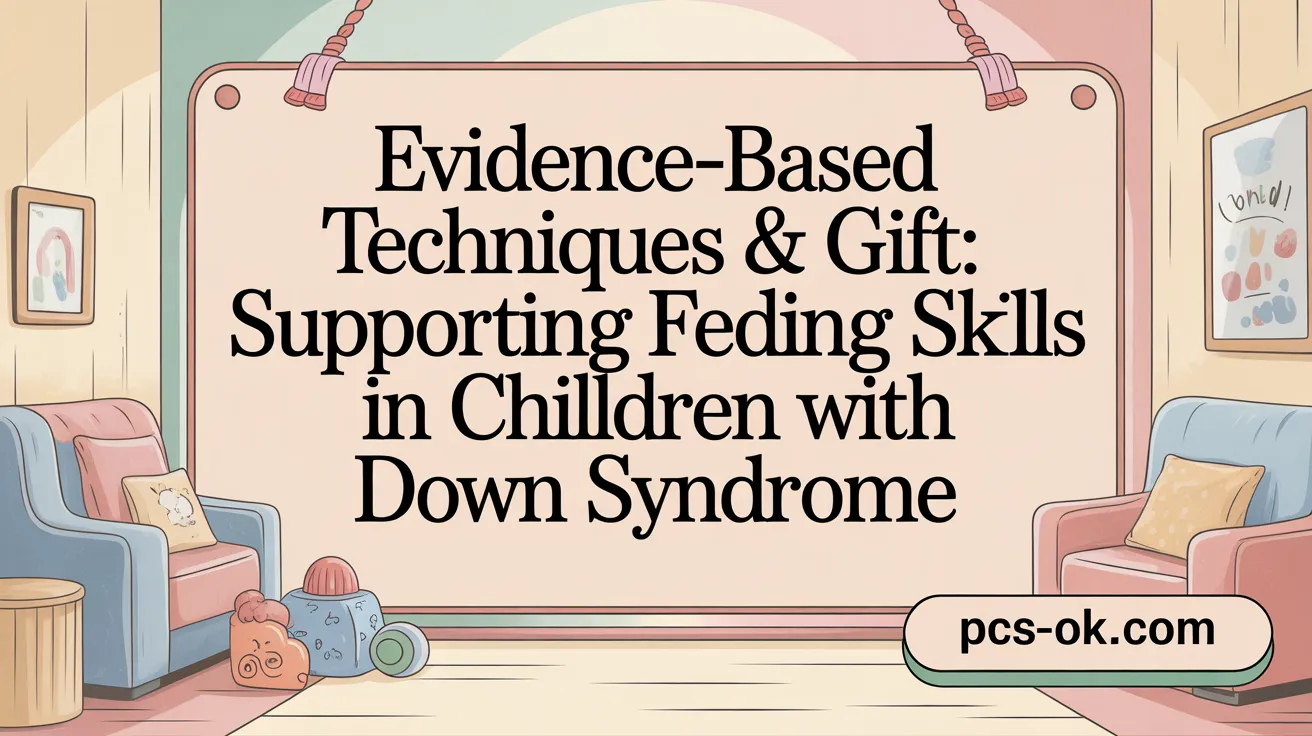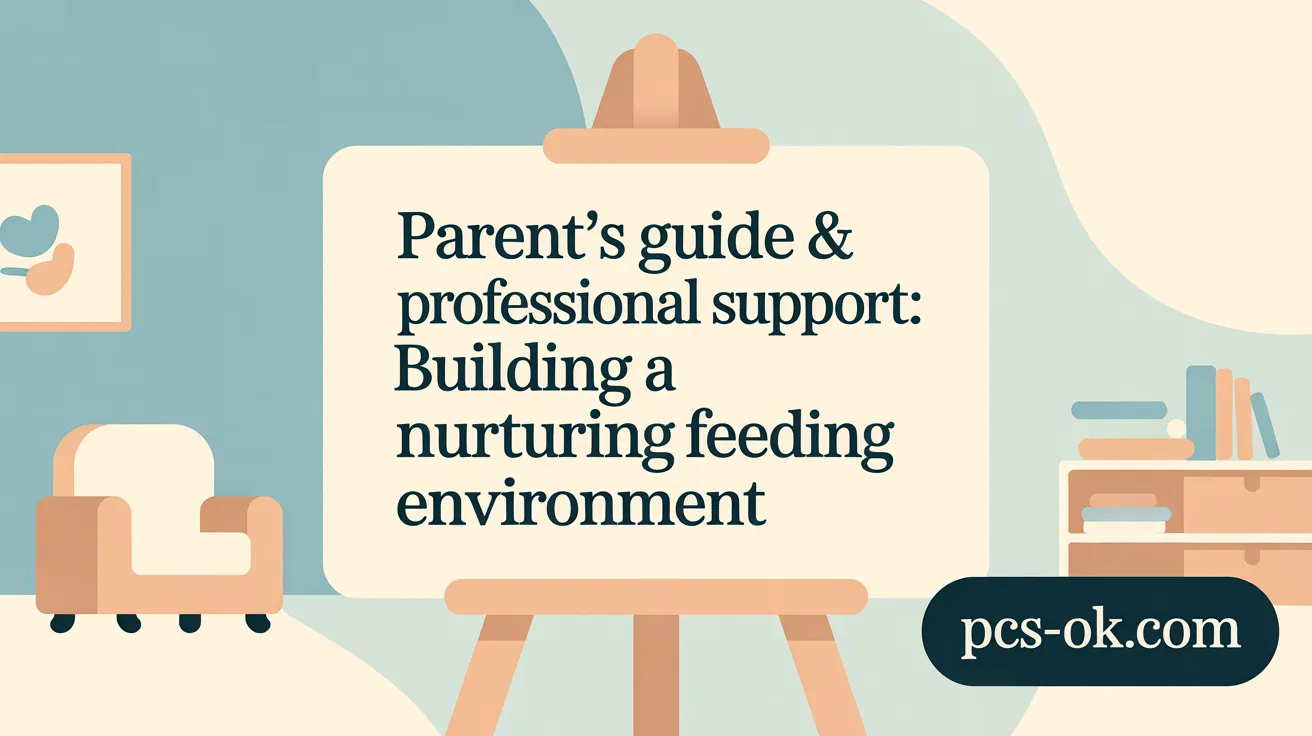Feeding Therapy for Children With Down Syndrome
Understanding the Complexities of Feeding Challenges
Children with Down syndrome often face unique feeding and swallowing difficulties that impact their nutritional intake and overall health. Addressing these challenges through early identification, comprehensive assessment, and tailored feeding therapy is crucial to supporting their growth and development. This article explores the common difficulties, assessment methods, developmental factors, effective therapy approaches, and practical guidance for families and professionals involved in feeding therapy for children with Down syndrome.
Common Feeding and Swallowing Challenges in Children with Down Syndrome
What are the common feeding and swallowing challenges in children with Down syndrome?
Children with Down syndrome often face difficulties related to feeding and swallowing at various stages of their development. These challenges can be observed when children start eating solids and continue through childhood and beyond.
One of the main issues is poor orosensorimotor abilities. This includes delayed or abnormal reflexes necessary for safe chewing and swallowing. Children may also struggle with chewing, pocketing food (storing food in the cheeks), and coordinating the complex movements needed for swallowing.
Physical factors such as low muscle tone (hypotonia) and poor postural stability can further affect feeding. For example, children might have trouble sitting upright or supporting their trunk during meals, increasing the risk of choking or aspiration.
In addition to physical challenges, medical issues like reflux, gastrointestinal discomfort, or other health conditions can complicate feeding. Behavioral factors also play a role; some children refuse food, gag easily, or show sensory sensitivities that make mealtime difficult.
Signs pointing to swallowing problems, or dysphagia, include coughing, choking, congestion, and frequent respiratory illnesses. Behavioral cues such as food refusal, gagging, or vomiting are also common indicators.
Early assessment and intervention by a multidisciplinary team—comprising pediatricians, speech therapists, occupational therapists, and dietitians—are essential. Tailored strategies help promote safe feeding practices, ensure adequate nutrition, and support the child’s growth and development throughout life.
Assessment and Identification of Feeding Difficulties

How are feeding difficulties in children with Down syndrome assessed and identified?
Assessing feeding challenges in children with Down syndrome involves a thorough and collaborative process. A multidisciplinary team, including pediatricians, speech-language pathologists, occupational therapists, nutritionists, and sometimes physiotherapists, works together to gather a comprehensive understanding of the child’s feeding abilities.
Clinicians begin with detailed medical and developmental histories, noting any medical issues, oral motor skills, and feeding behaviors. Observations during mealtimes help identify signs like coughing, choking, gagging, food refusal, or difficulty chewing. Speech-language pathologists often perform bedside assessments, examining oral structures, muscle tone, and swallowing patterns.
Visual tools like videofluoroscopic swallow studies (VFSS) or fiberoptic endoscopic evaluation of swallowing (FEES) are instrumental in visualizing swallowing mechanics. These assessments reveal whether aspiration or other safety concerns exist during swallowing.
Standardized evaluation tools play a crucial role. The Pediatric Screening–Priority Evaluation Dysphagia (PS–PED) screens for the risk of dysphagia. The Karaduman Chewing Performance Scale (KCPS) measures chewing ability, while the International Dysphagia Diet Standardization Initiative (IDDSI) categorizes food textures and intake safety.
Further assessments include sensory processing evaluation to understand how sensory sensitivities influence food acceptance and behavioral assessments to address mealtime behaviors. Recognizing issues like reflux or gastrointestinal discomfort is also vital, as these can impair feeding.
Early identification through these layered assessments allows for personalized intervention plans. Proper diagnosis supports safer eating practices, enhances nutrition, and promotes independence during mealtimes, ultimately improving the child’s overall health and development.
Developmental Milestones and Influencing Factors in Feeding

What developmental milestones and factors influence feeding development in children with Down syndrome?
Feeding development in children with Down syndrome tends to vary from that of typically developing children, often experiencing delays and challenges. Physical factors such as reduced muscle tone, known as hypotonia, significantly impact the ability to suck, swallow, and chew effectively. Oral motor skills, including tongue movements, lip strength, and jaw stability, are often less mature, making initial feeding and progressing to solid foods more difficult.
Sensory processing differences also play a role. Some children may have reduced oral sensitivity, which affects food preferences and acceptance. These sensory issues can cause food fussy-ness or refusal, and can make children hesitant to try new textures or tastes.
Health factors, such as frequent ear infections, respiratory problems, or gastrointestinal issues, can further complicate feeding. Emotional and behavioral influences, including food refusal, gagging, and distress during meals, are often observed, requiring patience and tailored strategies.
Progression through feeding milestones—like moving from simple sucking to chewing, and from purees to more textured foods—may be slower. Many children with Down syndrome also encounter delays in developing self-feeding skills, such as holding utensils or drinking independently.
To support optimal growth and nutrition, a multidisciplinary team approach is essential. Professionals such as speech-language pathologists, occupational therapists, and dietitians assess and create individualized plans that encourage gradual development.
Caregivers are advised to recognize readiness cues, like head control, trunk stability, and interest in food, to introduce new textures or self-feeding activities gradually. Creating a positive mealtime environment with sensory exploration, patience, and encouragement enhances the child’s confidence and willingness to eat.
In summary, understanding these influential factors and milestones helps promote effective feeding strategies, leading to better nutrition and overall development for children with Down syndrome.
Effective Feeding Therapy Techniques and the Global Intensive Feeding Therapy (GIFT) Model

What evidence-based feeding therapy techniques and tools are effective for children with Down syndrome?
Children with Down syndrome often face unique challenges when it comes to feeding, which can include delayed motor skills, sensory sensitivities, and structural differences in the oral cavity. To address these issues effectively, therapists employ a variety of evidence-based techniques.
Oral motor exercises are crucial in helping develop biting, chewing, and swallowing skills. Sensory integration strategies enhance oral responsiveness by gradually introducing flavors, textures, and temperatures, which can increase tolerance and acceptance.
Positioning during feeding is also vital. Supporting proper posture—such as keeping the child upright with ears above the mouth—helps improve swallowing safety and reduces the risk of ear infections.
Adaptive tools like shallow-bowl spoons facilitate easier eating, while gradual introduction of puree textures through controlled mouth movements promotes progression in eating skills. Regular assessments by pediatric speech-language pathologists and occupational therapists ensure plans are customized to each child’s specific needs.
Supporting caregivers with education on responsive feeding techniques, and providing guidance on nutrient choices and mealtime strategies, ensures these evidence-based practices are applied consistently. Early and ongoing intervention significantly contributes to safer, more efficient feeding and better nutritional outcomes for children with Down syndrome.
What is Global Intensive Feeding Therapy (GIFT), and how does it support feeding development in children with Down syndrome?
Global Intensive Feeding Therapy (GIFT) is a specialized, structured program aimed at rehabilitating feeding difficulties by improving oral motor functions, swallowing safety, and food acceptance. GIFT involves 15 therapy sessions conducted over five consecutive days, focusing on repetitive, targeted exercises that stimulate neuroplasticity.
The therapy incorporates sensory and motor activities tailored to each child’s capacities, emphasizing skill development in chewing, swallowing, and oral awareness. Caregiver involvement is a core component, empowering parents or caregivers to continue techniques at home to reinforce progress.
Research indicates that GIFT leads to significant improvements in chewing performance, ability to accept various food textures, and overall feeding success. Outcomes are maintained at follow-up, making it a promising intervention for children with Down syndrome who face persistent feeding challenges.
This intensive approach accelerates skill acquisition by providing concentrated, individualized therapy, fostering confidence in children’s eating abilities, and supporting healthier growth and development.
Guidance for Parents and Specialist Treatment Options

What practical guidance and tips can parents and caregivers use to support feeding development at home for children with Down syndrome?
Supporting children with Down syndrome in their feeding journey involves creating a calm and structured environment. Establishing consistent mealtime routines helps build familiarity and security. Encourage children to explore new foods by touching, smelling, and tasting in a fun, pressure-free way. Using dips like hummus or guacamole can make trying new tastes enjoyable. Patience is essential—accept behaviors like spitting or grimacing as normal parts of learning. Maintain proper posture during meals, such as sitting upright with support for the trunk, to promote safe swallowing. Offering a variety of healthy foods at regular intervals, eating together as a family, and avoiding distractions foster positive experiences. Working with a multidisciplinary team, including therapists and health professionals, ensures tailored strategies that address sensory, motor, and medical challenges.
Creating positive mealtime environments
A supportive mealtime atmosphere is crucial. Sensory exploration—using different textures, temperatures, and flavors—can enhance oral responsiveness. Modeling eating behaviors at eye level and respecting nonverbal cues help children feel comfortable and in control. Incorporating fun activities, like blowing bubbles or using straws, can improve oral-motor skills and make meals more engaging. Avoiding quick reactions to food refusal or fussiness promotes patience and reduces anxiety. Consistent, enjoyable mealtimes help children develop confidence and improve their acceptance of diverse foods.
Recognizing and responding to readiness cues and behaviors
Watching for signs of readiness—like good head control, interest in food, and sitting independently—guides effective feeding. Children may show cues such as reaching for food or opening their mouth in anticipation. If a child exhibits behaviors like spitting out food, gagging, or refusing to try new textures for more than 2-3 weeks, it may signal a need for professional evaluation. Monitoring weight gain, exploring new flavors gradually, and adjusting textures are important steps. Providing a calm, pressure-free environment allows children to explore and accept foods at their own pace.
Multidisciplinary treatment options and specialist involvement
Children with feeding difficulties benefit from a team approach. Speech-language pathologists and occupational therapists assess and develop individualized therapy plans focusing on oral-motor skills and sensory integration. Medical professionals, including pediatricians and dietitians, address underlying health issues like reflux, allergies, or constipation. Therapy may include techniques such as palatal massage, tongue placement training, and jaw stabilization exercises. These specialists work closely with families, providing education and home strategies to support progress. Regular follow-up ensures that feeding plans are adapted as the child’s needs evolve.
Medical interventions and nutritional counseling
Medical management might involve addressing health conditions affecting feeding, such as reflux or allergies, with medication or dietary modifications. Nutritional counseling helps tailor feeding plans that promote balanced growth and prevent overweight or undernutrition. Dietitians guide families on texture progression, meal composition, and appropriate portion sizes, considering the child’s unique preferences and sensitivities. In some cases, supplemental support or tube feeding may be necessary, especially during periods of difficulty or illness. Collaborative care ensures that children receive safe, nutritious, and developmentally appropriate nutrition, fostering optimal growth and health.
Supporting Lifelong Feeding Success
Feeding challenges in children with Down syndrome are complex and multifaceted, requiring early identification, thorough assessment, and personalized intervention strategies. Evidence-based feeding therapies, including innovative approaches like GIFT, alongside parental support and multidisciplinary care, can significantly improve oral motor skills, feeding safety, and food acceptance. Empowering families with practical guidance and collaborating with specialists ensures that feeding development is optimized, promoting better health and quality of life for children with Down syndrome throughout their lifespan.
References
- Food for Thought: Addressing Feeding and Swallowing …
- Managing Feeding Issues in Children with Down Syndrome.
- Feeding + Swallowing
- Introduction of Spoon Feeding in Infants and Children with …
- Assessment and Rehabilitation Intervention of Feeding …
- Feeding picky toddlers with Down syndrome
- A Scoping Review of the Complementary Feeding …
- Pediatric Feeding Therapy for Children with Medical …
- Down syndrome | Conditions | What we treat
